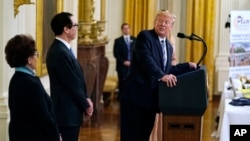The US Senate on Wednesday approved reforms to the popular Paycheck Protection Program that will give small businesses greater flexibility in using the coronavirus crisis funds.
The measure, which cleared the House of Representatives by a 471-1 vote, unanimously passed the Senate and now heads to President Donald Trump's desk for his signature.
The new changes to the PPP, established as a lifeline for small businesses struggling to stay afloat during coronavirus lockdowns, allow for more flexibility in how the relief loans are used, and in the time given to businesses to repay the funds.
"These changes will let business owners spend their PPP funds over a longer period of time, use a larger percentage of the loan on non-payroll expenses (like rent), and more," said Senator Angus King, an independent who aligns with Democrats.
The two phases of the PPP have provided a total of $669 billion in lending.
"The PPP is a pro-worker, bipartisan program that has been hugely successful in protecting 50 million employees and helping small business owners endure this crisis," said Senate Republican Marco Rubio, chairman of the small business committee.
The bill would extend from eight weeks to 24 weeks the period when funds must be spent for the loans to be forgiven, and would also give businesses as long as five years to repay any money owed on a loan, up from two years.
Businesses would be able to use a larger percentage of the funds on rent and other approved non-payroll expenses.
The bill would require that 60 percent of a loan be used on payroll, instead of 75 percent -- a current stipulation that frustrates businesses like restaurants, which are grappling with high overhead costs.
Congress is meanwhile working on a massive new measure to provide fresh economic relief for Americans and fund local pandemic response efforts.
But the $3 trillion bill, which passed the Democratic-led House, faces opposition from Senate Republicans who branded it an exorbitant liberal wish list.




